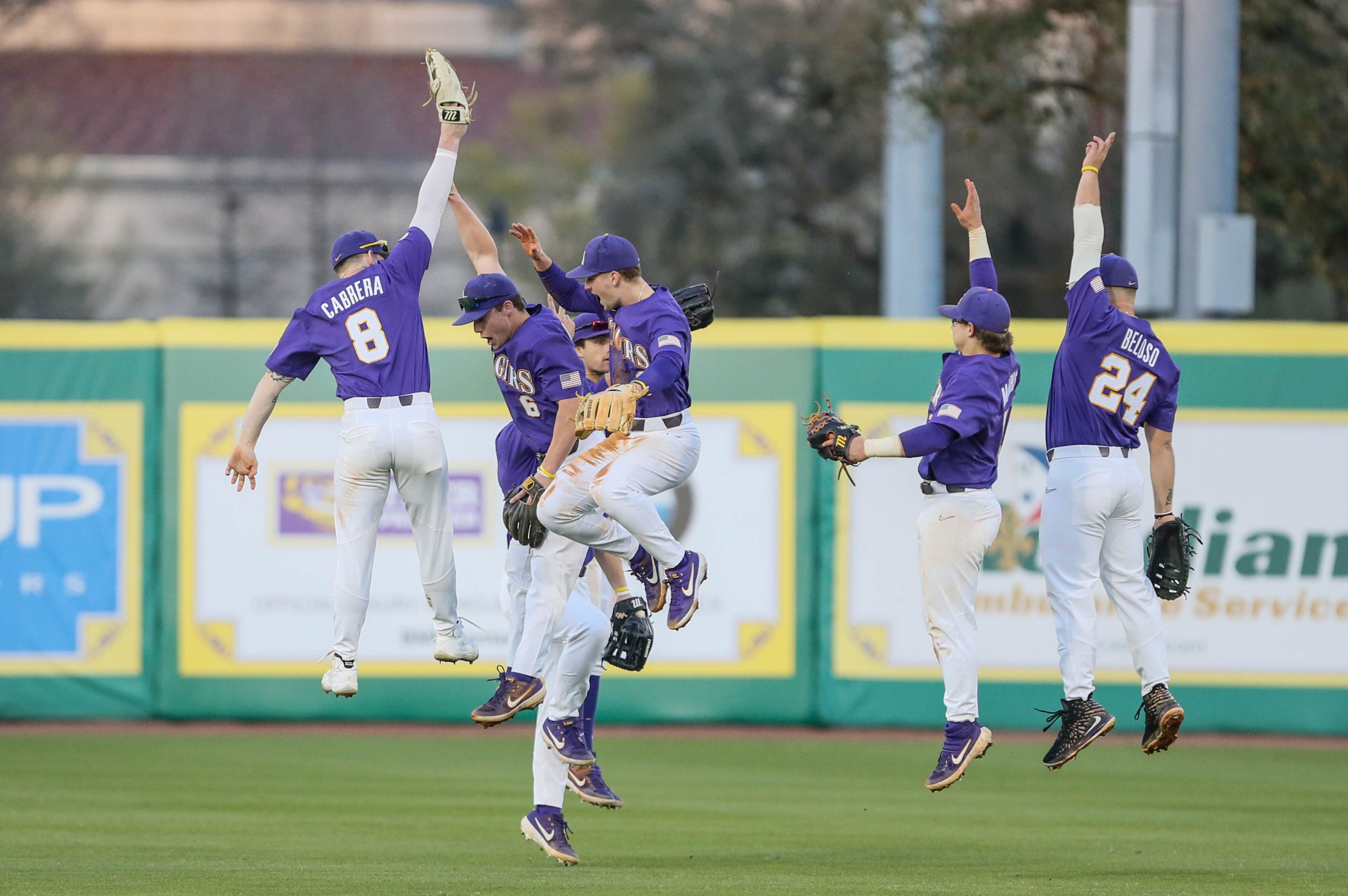
It’s been a rite of passage each summer Nolan Cain has been a part of LSU’s baseball coaching staff, especially since taking over in his role of recruiting coordinator the last three years.
Several years ago while recruiting at a big showcase event in Georgia, Cain was in search of LSU’s future shortstop in its Class of 2020. After several fruitless days of watching hopefuls at the U15 event, he returned and among the eight fields at the facility unknowingly picked the one where a 135-pound shortstop from Chula Vista, Calif. caught his eye.
Jordan Thompson wasn’t a highly recruited prospect at that time but fit all of the requisite categories Cain looked for and admired in a shortstop.
“He was such a quarterback; he was running the show in the middle of the field,” Cain said. “He was controlling the running game. I just fell in love with the way he took groundballs in between innings. The way he interacted with his teammates and his coaches; you could tell he had an extreme passion for the game.”
Cain tried to make up for lost time. He attended the remainder of Thompson’s games at that tournament, even drifting near the team’s dugout to get within earshot of the commentary between Thompson and his teammates and coaches.
“He had some leadership qualities that I really liked,” Cain said.
That was the beginning of a relationship that resulted in Thompson being offered a scholarship, signing with LSU where the nation’s No. 53 rated prospect and now 6-foot-1, 185-pounder is considered among the headliners in head coach Paul Mainieri’s current recruiting class.
“He ended up being a really good recruit that we were able to get to school,” Cain said.
The method in which Cain, along with LSU’s coaching staff, traditionally have gone about constructing its recruiting classes has dramatically been altered during the coronavirus pandemic.
With the NCAA extending its recruiting dead period through the end of August, the days of collegiate coaching staffs going on the road for long stretches of the summer to recruit, have been replaced by a virtual approach that’s required LSU’s staff to be extremely organized and patient.
“It’s been interesting,” Cain said. “When you’re on the road you’re putting a weekly plan together and kind of adjusting from there. Right now, it’s so instantaneous. It’s so in the moment, you’re putting a daily plan together.”
Instead of spending stretches such as 38 of 45 days of the summer recruiting, LSU’s staff has adjusted to sitting in front of a desktop, tablet or phone watching games being live streamed of prospects of interest.
Depending on the volume of players and the times of their respective games, Cain said coordinating such a daily endeavor became imperative to watch as many prospects as possible.
“It’s almost easier to be on the road and make adjustments on the fly,” Cain said. “You’re in Atlanta or Texas and can tell the weather’s not going to be very good, you could go to another game or it could be rescheduled for another time. Here, you’re relying on schedules which could be in different time zones. I’ve had to text (summer ball) coaches to ask whether they’re playing because the live stream’s not working.”
Without the ability to be hands on, watching intently under the summer’s unrelenting heat, entities such as Perfect Game, Prep Baseball Report and FloSports have been extremely beneficial in live streaming games in real time.
Cain said depending on the quality of the stream, watching a game of a specific player has been advantageous because of the ability to watch from two camera angles – one from behind center field which helps in evaluating pitchers and hitters along with a full-field view from a camera located on top of the press box.
“You get a pretty decent idea how a position player moves, how fast he is, running down the (base) line,” Cain said. “It’s still tough to see the footwork or how good their hands are on the infield because the view is from so far away.
However, for a coach such as Cain who values the kind of intangibles that led him to eventually sign Thompson, the current recruiting process entails additional leg work to compensate for player characteristics not visible on a live stream. That requires digging deeper into a potential prospect’s mental makeup with follow-up calls to either his high school or travel coach for an off-the-field perspective.
While college coaches can get access to valuable analytics reports such as Rapsodo for pitchers and Trackman for both pitchers and hitters, there’s nothing like a ringing endorsement of a prospect from the those closest to him.
“You’re really putting a lot of trust into the people that you trust for evaluations and people that are kind of hands on with the kids,” Cain said. “There’s nothing wrong with that at all. You want to make sure that you’re getting it right. You’re spending a little more time on the communication factor with the people that are in touch with these kids on a daily basis.
“You’re relying on looking at tools. They’re so many talented players these days. The tools aspect, a lot of the kids have those, but it’s the separating factors like the makeup, the passion for the game. Those are the things we love as a program.”
LSU’s staff has also had to adapt to building its future classes without the benefit of having a summer camp.
Part of the NCAA’s dead period includes programs having to eschew conducting camps or ‘showcases’ which LSU would have started this weekend with the first two of six scheduled events.
The camps have proven immeasurable over the years from not only identifying a possible prospect that may have slipped under the radar, but to building existing relationships with prospects and being able to show off Alex Box Stadium and its state-of-the-art facilities which will include a renovated team meeting room.
Cain estimated LSU has signed more than 30 players who attended camp since 2013.
“The great thing about camp is if they’re from out of state they can be on our field, hit in our cages and see our facilities,” Cain said. “If a kid’s extremely interested in LSU, they may come a day early and go see Baton Rouge, walk through campus and see if LSU’s their dream school or if they could see themselves playing here. Those things have been taken away from a kid being able to see everything.”
LSU’s staff has persevered during these unchartered times.
The Tigers currently are ranked fourth by Perfect Game with 14 commitments in the Class of 2021 – having four to five fewer pledges than the teams rated above them – while sporting the No. 1 group with 13 commitments in the Class of 2022, while the Class of 2023 with six pledges hasn’t been ranked yet.
“It’s just such a team effort,” Cain said. “It’s done with coach Mainieri, (pitching coach) Alan Dunn and (hitting coach) Eddie Smith as well. We’re happy. We just have to build and continue to get great players.”




Be the first to comment